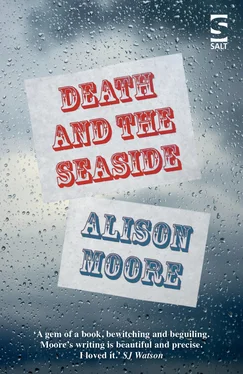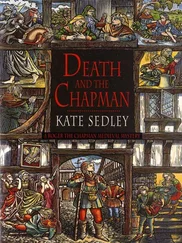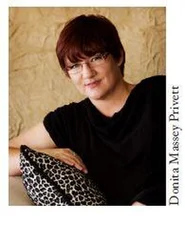‘Come on,’ said Sylvia, reaching across and unbuckling Bonnie’s seat belt. Sylvia climbed out from behind the steering wheel and went around to the passenger side to open Bonnie’s door, shepherding her out of the car.
Bonnie noticed the pay and display sign that was screwed to the wall. Reading it, she said to Sylvia, ‘You can’t park here for more than four hours.’
‘Don’t worry about that,’ said Sylvia. ‘I’ll move it later.’
Bonnie went round to the boot to get their suitcases out.
‘Leave the suitcases for now,’ said Sylvia. ‘We can do that later.’
Bonnie looked at the Hook and Parrot’s facade. ‘It’s not how I remember it,’ she said. She turned to face the ancient sea, and took a deep breath of sea air.
‘We’ll go for a little walk first,’ said Sylvia, ‘and then we’ll go inside.’
They walked along the concrete esplanade, passing a woman whose face was made up like an actor’s, like a chorus girl’s; her make-up was heavy enough to show up under stage lights.
‘Look,’ said Sylvia, pointing to the ground, ‘Here’s one of the signs you put into your story.’ The letters painted onto the concrete said ‘NO CYCLING’. They walked on, and Sylvia pointed out the other signs that said ‘Dogs not allowed’ and, next to a picture of a seagull, ‘PLEASE DON’T FEED ME’.
When they reached the storm gates in between the esplanade and the beach, Bonnie said, ‘Let’s go back now.’
‘We’ll go to the pub and have something to eat,’ said Sylvia. ‘Then we’ll go up to our rooms, and maybe actually being there will help you find the ending to your story.’
The front of the Hook and Parrot was white, or almost white, white with a hint of purple, or white with an old layer of purple underneath, almost showing through. Or perhaps it was just the light; perhaps it was just white.
It was the strangest thing, to walk inside the Hook. It was like walking into a story, although, at the same time, it wasn’t. Bonnie looked around at the interior, which was nothing like in her story. She had never actually been inside the Hook; she had only used the name and apart from that had made it up entirely.
‘I’ll get us some drinks and menus,’ said Sylvia, ‘while you go and sit down.’
‘A lemonade for me, please,’ said Bonnie.
‘Diet?’ said Sylvia.
‘All right,’ said Bonnie. ‘Thanks.’
Bonnie went over to a window seat, facing the bar and a display of peanuts. She fancied some peanuts. Just next to the bar, there was a row of gumball machines. She liked gumball machines; putting a coin into a gumball machine was like playing a slot machine but winning every time.
There was hardly anyone else in the pub, only a trio of men at the bar, whose conversation she could hear. Two of the men, who had each bought a round, while the third man had not, were joking about this other man having short arms. ‘My arms are short,’ said the man. ‘And so are my dad’s, and so were his dad’s. I swear to you,’ he said, ‘I am evidence of a Victorian breeding programme designed to breed children with short arms so that they couldn’t touch their privates at night. You know how they were always tucked very tight into their beds so they wouldn’t play with themselves? Well, in this case, the Victorians were, instead, engineering shorter arms to put a stop to the fiddling.’ The other men laughed, and the man with the short arms shook his head. ‘Seriously,’ he said, ‘look at me,’ and he reached out with his short arm for his pint.
‘Here we are,’ said Sylvia, coming over to the window seat with two drinks and a menu. Both the drinks looked the same, and Bonnie put her hand out for one. ‘Not that one,’ said Sylvia. ‘It’s got vodka in it,’ she added, pushing the other glass towards Bonnie, who could not tell the difference by looking. ‘This one’s yours.’ Bonnie took her diet lemonade, which was fizzing fast, like speeded-up film.
They sipped their drinks and looked at the menu. ‘I think I’ll have the Lyme Bay Crab Salad,’ said Sylvia. Bonnie had seen crabs being caught by the holidaymakers in Lyme Regis: surprisingly tiny crabs, babies, put into buckets of sun-warming water lined up on the harbour wall. She had wanted to tip them back into the sea. She worried about them being put into car boots and forgotten about until they started to smell of death.
‘I’ll have the Cheesy Chips,’ said Bonnie.
‘They’ve got desserts as well, if you want one,’ said Sylvia. ‘Various things with custard.’
‘I don’t like custard,’ said Bonnie. She had not been able to eat it since she ate a bowl of custard in the garden when she was little, and swallowed what felt like glass. ‘Grass?’ said her mother, when Bonnie ran into the kitchen to tell her. ‘Glass,’ said Bonnie. ‘It won’t have been glass,’ said her mother. ‘Perhaps it was an insect. It won’t hurt you.’ And as Bonnie got older, she too thought: It can’t have been glass , even though such things did happen, such things did get into food; but still, she thought, it was probably a blade of grass, which can cut like paper, or else an insect with a sting. She could still not eat a bowl of custard though. She was generally wary of food that she had not prepared herself, even though she was no cook.
‘Shall I go and order?’ asked Bonnie, unzipping her purse, which was stuffed with old receipts and all sorts of things that she pulled out, searching for paper money.
Sylvia picked something out of all the litter. ‘What’s this?’ she asked.
Bonnie looked at the little origami figure that Sylvia was holding. ‘I found it in my flat,’ she said, ‘in the desk drawer. I think it’s some sort of bird, a flightless bird, like a chicken or a dodo.’
‘It’s a chicken,’ said Sylvia. ‘My grandmother used to make these. She showed me how to do it when I was little. I could probably do it now. You don’t forget these things once they’re in your head.’ Bonnie gave her the silver paper from inside her cigarette packet, and watched as Sylvia folded it corner to corner, folded again, turned it and lifted a flap and refolded, and already Bonnie was quite lost and would never have been able to retrace the steps. She had never even known how to make a paper hat or a boat. All of a sudden, there it was, standing on the table in front of her: a silver-paper chicken, and Bonnie thought of Blade Runner , and the cop saying, It’s too bad she won’t live. But then again, who does? , like the chaplain in The Outsider who said that everyone was condemned to death: if you don’t die soon, you’ll die one day.
‘Chickens aren’t really flightless, you know,’ said Sylvia, ‘unless they’ve had their wings clipped. They can fly, they just tend not to; they don’t really need to, unless they feel they’re in danger.’
Bonnie put the litter back into her purse, leaving the paper chickens standing on the table like two sentry guards. She started to get to her feet. ‘If I go and order,’ she said, ‘I can ask about the room, and the phone.’
‘I’ll go,’ said Sylvia, standing up. ‘I’m nearer than you, and I have the booking reference.’
While Sylvia went to the bar, Bonnie sat and looked out of the window, thinking about Lyme Regis, which was mentioned in the shipping forecast, which Bonnie heard in the dead of night: Selsey Bill to Lyme Regis, and Lyme Regis to Land’s End; fair, moderate, occasionally very poor, and then ‘God Save the Queen’.
She sat with the big oblong windows in between her and the climbing sea, and waited.
Bonnie woke feeling heavy, as if she had fallen asleep on the beach in the sun, except that she was in a bedroom, tucked up in bed, underneath a yellow blanket. Her arm was flung back, bent beneath her head, and she had to move it with her other hand so as to get the blood back into it. The dead weight was unsettling — like a ten-pound leg of lamb lying on the pillow , she thought.
Читать дальше












